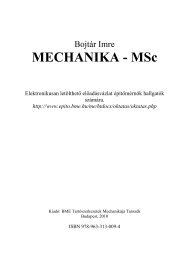You also want an ePaper? Increase the reach of your titles
YUMPU automatically turns print PDFs into web optimized ePapers that Google loves.
D, Havel PJ (June 2004). "Dietary fructose reduces circulating insulin and leptin, attenuates<br />
postprandial suppression of ghrelin, and increases triglycerides in women". J Clin Endocrinol<br />
Metab. 89 (6): 2963–72. doi:10.1210/jc.2003-031855. PMID 15181085.<br />
58. Swan, Norman; Lustig, Robert H. "ABC Radio National, The Health Report, The Obesity<br />
Epidemic". http://www.abc.net.au/rn/healthreport/stories/2007/1969924.htm. Retrieved<br />
2007-07-15.<br />
59. Ouyang X, Cirillo P, Sautin Y, et al. (June 2008). "<strong>Fructose</strong> consumption as a risk factor for<br />
non-alcoholic fatty liver disease". J. Hepatol. 48 (6): 993–9. doi:10.1016/j.jhep.2008.02.011.<br />
PMID 18395287.<br />
60. "Gout surge blamed on sweet drinks". BBC News. 2008-02-01. http://news.bbc.co.uk/1/hi/<br />
health/7219473.stm.<br />
61. Johnson, Richard Joseph; Timothy Gower (2008). The Sugar Fix: The High-<strong>Fructose</strong> Fallout<br />
That is Making You Fat and Sick. US: Rodale. pp. 304. ISBN 10 1-59486-665-1.<br />
62. Sugar, the Bitter Truth. University of California. 2009-07-02. http://www.youtube.com/<br />
watch?v=dBnniua6-oM.<br />
63. Recipe Information for home baking at<br />
Glucose, <strong>Fructose</strong> and Sucrose: What’s the Difference Between<br />
These Sugars … and Which is the Worst for Your Health?<br />
The sugar in your soda and other favorite<br />
sugary treats may all go down sweetly, but a<br />
groundbreaking new study found they act very<br />
differently once in your body.<br />
It may all taste equally sweet, but the type of sugar<br />
you eat matters big-time for your health.<br />
The three main types of sugar in question are:<br />
1. Glucose: made when your body breaks down<br />
starches<br />
2. <strong>Fructose</strong>: the sugar found naturally in fruits<br />
and widely used in the form of high-fructose<br />
corn syrup<br />
3. Sucrose: table sugar<br />
Researchers from the University of California, Davis<br />
compared refined glucose and refined fructose<br />
consumption among 32 overweight or obese<br />
people and found they resulted in very different<br />
health changes.<br />
After drinking either a refined fructose- or glucosesweetened<br />
beverage that made up 25 percent<br />
of their daily calories for 12 weeks, both groups gained a similar amount of weight. However,<br />
those drinking the fructose-sweetened beverage experienced an array of other unhealthy effects,<br />
including:<br />
• An increase in visceral fat, the kind that embeds itself between tissues in organs<br />
• Less sensitivity to insulin, one of the first signs of diabetes<br />
• Increased fat production in the liver<br />
• Elevated LDL (bad) cholesterol<br />
• Increased levels of triglycerides<br />
People who drank the refined glucose-sweetened beverage, meanwhile, experienced no such<br />
changes.<br />
"This suggests that in the same way that not all fats are the same, not all dietary carbohydrates<br />
are the same either," Peter Havel, professor of nutrition at the University of California Davis and<br />
lead author of the study told TIME magazine.<br />
When glucose is consumed, a set of reactions occur in the body allowing it to be used as energy,<br />
and production of leptin, a hormone that helps control appetite and fat storage, is increased.<br />
Meanwhile, ghrelin, a stomach hormone, is reduced, which is thought to help hunger go away.<br />
When refined fructose is consumed, however, it "appears to behave more like fat with respect<br />
to the hormones involved in body weight regulation," explains Peter Havel, associate professor<br />
of nutrition at the University of California, Davis. "Refined <strong>Fructose</strong> doesn't stimulate insulin<br />
secretion. It doesn't increase leptin production or suppress production of ghrelin. That suggests<br />
that consuming a lot of fructose, like consuming too much fat, could contribute to weight gain."<br />
And as this most recent study pointed out, it may cause other dangerous side effects as well.<br />
Most Sweets Contain Refined <strong>Fructose</strong> or Refined Sucrose<br />
This news may compel you to begin searching for glucose-sweetened versions of your favorite<br />
desserts and sodas, but most sugary products are made with either refined sucrose or fructose,<br />
often in the form of high-fructose corn syrup.<br />
Sucrose is made of 50% fructose and 50% glucose, whereas high-fructose corn syrup can be either<br />
55% fructose, 45% glucose, or 42% fructose, 58% glucose.<br />
What this means is that you’ll be hard pressed to find products sweetened with glucose, and may<br />
risk the side effects discovered in this study no matter which type you choose.<br />
"This study provides the best argument yet that we should either decide to consume less refined<br />
sugar-sweetened beverages in general, or that we should conduct more research into the<br />
possibility of using other sweeteners that may be more glucose-based," Matthias Tschoep, an<br />
obesity researcher at the Obesity Research Center in the University of Cincinnati, said in TIME.<br />
The Refined <strong>Fructose</strong>-Diabetes Connection<br />
According to Dr. Walter Willett, chair of the department of nutrition at the Harvard School of<br />
Public Health, long-term consumption of sugared drinks, which are typically sweetened with<br />
high-fructose corn syrup, may double your risk of obesity. Part of the risk is simply from the extra<br />
126 127

















